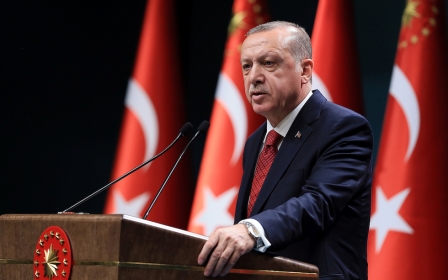Turkey finds 3,000 Gulenists in military, two years after coup attempt

Turkish authorities have identified 3,000 people within the armed forces believed to be linked to the cleric Ankara blames for a 2016 failed coup, Defence Minister Nurettin Canikli said, adding they would be dismissed in the coming days.
Canikli was quoted by broadcaster NTV as saying the suspects, believed to be linked to US-based cleric Fethullah Gulen, would be dismissed from their posts through an emergency decree presented to the prime ministry.
"We discovered a structure of 3,000 people in the [army]," he said, adding they would be expelled by a new decree.
The Turkish army has seen large numbers arrested and dismissed following the July 2016 coup, along with hundreds of thousands of other suspected Gulen supporters.
On Wednesday, the Turkish parliament extended the post-coup state of emergency for a seventh time, despite mounting calls from Ankara's partners to lift it.
We discovered a structure of 3,000 people in the [army]
- Nurettin Canikli, Defence Minister
The state of emergency was introduced five days after the coup against the president, Recep Tayyip Erdogan, but critics say it has been used to crack down on his opponents and stifle the media.
The National Security Council, after a meeting with Erdogan, said in a statement it had agreed to recommend the emergency should be extended for three more months.
The latest extension was due to come to an end on Thursday.
The next step is for parliament to approve the extension but this is viewed as a formality.
Turkish authorities have used emergency powers to arrest over 50,000 people accused of links to his group as well as Kurdish militants.
Meanwhile, more than 140,000 public sector employees have also been sacked or suspended, including judges, police officers and teachers.
The main opposition Republican Peoples Party (CHP) on Monday organised rallies across Turkey to protest against the emergency, including a demonstration in Istanbul and Ankara.
The party listed the impact of the state of emergency on freedom of expression and the economy, especially the Turkish lira which has lost over five percent of its value against the US dollar in the past month.
The emergency has come under fierce criticism in the West as well, including by Council of Europe chief Thorbjorn Jagland during his visit to Ankara in February.
In its latest report on Turkey's accession bid to join the European Union, the European Commission said on Tuesday that "Turkey should lift the state of emergency without delay".
"The broad scale and collective nature, and the disproportionality of measures... such as widespread dismissals, arrests, and detentions, continue to raise serious concerns," it said.
Erdogan also announced on Wednesday that a general election set for November 2019 would be brought forward to June 2018.
Although the president said the move was due to the urgent need for change in the Turkish political system, opposition politicians criticised the fact that the elections would be taking place under the state of emergency.
"The state of emergency needs to be lifted immediately, there cannot be an election under emergency rule. The country needs to be brought out of the emergency rule regime starting today," CHP spokesman Bulent Tezcan said.
Stay informed with MEE's newsletters
Sign up to get the latest alerts, insights and analysis, starting with Turkey Unpacked
Middle East Eye delivers independent and unrivalled coverage and analysis of the Middle East, North Africa and beyond. To learn more about republishing this content and the associated fees, please fill out this form. More about MEE can be found here.




